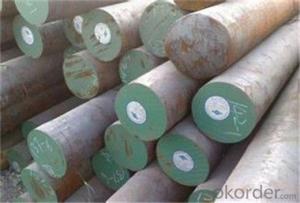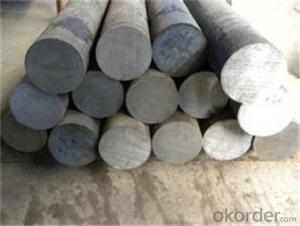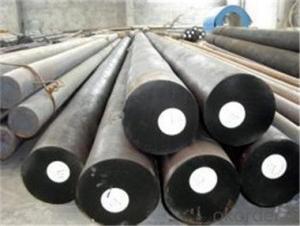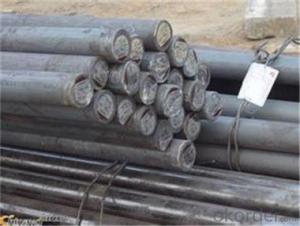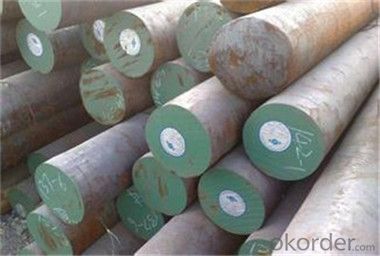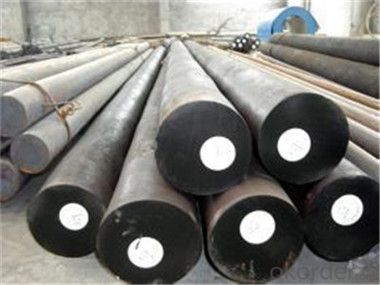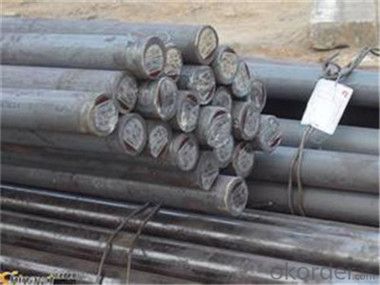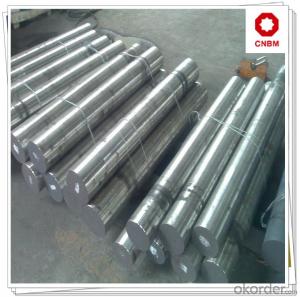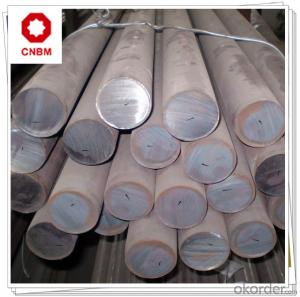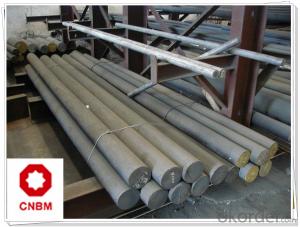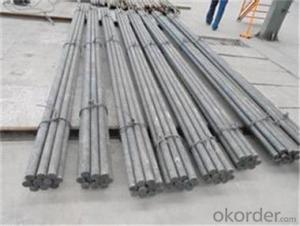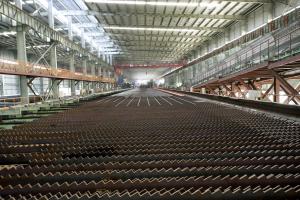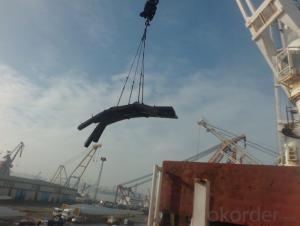Hot Rolled Carbon Steel Round Bar MS Bar
- Loading Port:
- Tianjin
- Payment Terms:
- TT OR LC
- Min Order Qty:
- 40 m.t.
- Supply Capability:
- 2000000 m.t./month
OKorder Service Pledge
OKorder Financial Service
You Might Also Like
Description of steel round bar:
1. Commodity: Round steel bar
3. Technical: Hot rolling
2. Length: Min. 5.8meter, according to requirement.
3. Diameter: 16mm-250mm
5. Packing: In Bundle or according to your requirements.
Festures of steel round bar:
Description : Steel Bar/Stainless Steel Round Bar/Alloy Steel Round Bar/Carbon Steel Bar
Stainless Steel Bright Bar/Stainless Steel Peeled Bar/Stainless Steel Polishing Bar
Diamater:
1 Hot rolled round bar diameter from 5.5mm to 110mm
2.Hot forged round bar diameter from 110mm to 400mm
3.Cold drawn round bar diameter from 2.0mm to 60mm
4.Grinding bar diameter from 4.0mm to 40mm
5.Turn smooth diameter from 40mm to 250mm
Specifications of steel round bar:
Length: standard 6m,9m,12m, or as customers' requirement
Surface: Black, polished, grinded, ,Bright, Turn smooth(Peeled),Brush,Mill,Pickled
Process:Hot rolled,cold drawn,forged
Packing: In bundle, tied by steel straps, covered with protecting film Use wooden box, fill with foam to keep the surface from damaging
Images of steel round bar:
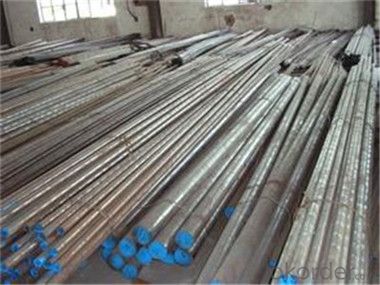
FAQ:
1. What is your main market?
We mainly export to Asia such as Japan,Korea,Thailand and North America and Middle East.
2. How long is the lead time?
Delivery time: 45 days after order confirmed.
3. What payment term do you accept?
Payment: T/T or L/C at sight.
4.Why do you choose to cooperate with us?
We have over10 years experience in this business so we are able to provide you the high quality products with the best price.
- Q: What is the maximum weight that can be lifted using a steel round bar as a lifting rod?
- The lifting capacity of a steel round bar depends on several factors, including its diameter, length, material composition, and lifting technique. Different steel round bars have different load-bearing capacities based on their dimensions and grade. Engineering principles and specific formulas can be used to calculate the load-bearing capacity of a steel bar based on its material and geometry. To determine the maximum weight that can be lifted with a particular steel round bar, it is important to consider its ultimate tensile strength, yield strength, and factor of safety. The ultimate tensile strength represents the maximum stress the material can handle before failure, while the yield strength is the stress at which permanent deformation occurs. The factor of safety is a design parameter that takes uncertainties into account and ensures structural integrity. To obtain accurate and reliable information about the load-bearing capacity of a specific steel round bar, it is crucial to consult engineering references, standards, or professionals. They can provide the necessary calculations, considering the bar's diameter, length, material properties, intended lifting application, and safety requirements. In conclusion, the maximum weight that can be lifted using a steel round bar as a lifting rod depends on various factors and cannot be determined without considering the specific characteristics of the bar and the lifting scenario. Consulting engineering resources or experts is essential to ensure safe and accurate calculations.
- Q: What are the different grades of carbon steel round bars for structural applications?
- Structural applications offer a variety of grades for carbon steel round bars, each possessing unique properties and characteristics. Some commonly used grades are as follows: 1. ASTM A36: Widely utilized for structural projects, this grade of carbon steel round bars boasts exceptional weldability and machinability. 2. ASTM A572-50: This high-strength, low-alloy structural steel grade provides an improved strength-to-weight ratio compared to traditional carbon steel. It is often employed in construction and structural applications requiring high strength. 3. ASTM A588: Primarily utilized in corrosion-resistant applications, this high-strength, low-alloy structural steel grade demonstrates excellent atmospheric corrosion resistance. It finds frequent usage in outdoor structures like bridges and buildings. 4. ASTM A709: Commonly employed in bridge construction, this high-strength, low-alloy structural steel grade offers outstanding strength, weldability, and toughness, making it ideal for demanding structural applications. 5. ASTM A105: This low-carbon steel grade possesses good strength and impact resistance, making it suitable for applications necessitating high strength and ductility, such as heavy equipment and machinery construction. These examples represent a limited selection of carbon steel round bar grades available for structural applications. The selection of an appropriate grade depends on factors including desired strength, weldability, machinability, and corrosion resistance. It is advisable to consult with a steel supplier or engineer to determine the most suitable grade for a specific application.
- Q: How do steel round bars compare to aluminum round bars?
- Steel round bars and aluminum round bars have several key differences in terms of their properties and applications. Strength and durability: Steel round bars are generally stronger and more durable than aluminum round bars. Steel has a higher tensile strength and can withstand higher loads and stresses compared to aluminum. This makes steel round bars suitable for heavy-duty applications where strength and durability are critical, such as construction projects or manufacturing machinery. Aluminum round bars, on the other hand, are less strong and more prone to bending or breaking under heavy loads, so they are typically used in lighter applications or where weight savings are important. Weight: Aluminum round bars are significantly lighter than steel round bars. This makes aluminum a popular choice in industries where weight is a crucial factor, such as aerospace or automotive manufacturing. The lightweight nature of aluminum round bars also makes them easier to handle and transport. Corrosion resistance: Aluminum round bars have excellent corrosion resistance due to the formation of a protective oxide layer on their surface. This oxide layer acts as a barrier, preventing further corrosion and making aluminum ideal for outdoor applications or in environments with high humidity or exposure to chemicals. Steel round bars, on the other hand, are more prone to rust and corrosion, so they require protective coatings or treatments to enhance their resistance to corrosion. Cost: Steel round bars are generally more cost-effective compared to aluminum round bars. Steel is a widely available and commonly used material, making it more affordable in most cases. Aluminum, on the other hand, is more expensive due to its production process and the higher energy requirements involved. Thermal conductivity: Aluminum round bars have excellent thermal conductivity, meaning they can efficiently transfer heat. This makes them suitable for applications where heat dissipation is crucial, such as heat sinks or electrical conductors. Steel round bars, while conducting heat to some extent, have lower thermal conductivity compared to aluminum. In summary, steel round bars are stronger, more durable, and cost-effective, making them suitable for heavy-duty applications. Aluminum round bars, on the other hand, are lighter, have excellent corrosion resistance, and superior thermal conductivity, making them ideal for lightweight applications and industries where weight savings or heat dissipation are critical. Ultimately, the choice between steel and aluminum round bars depends on the specific requirements of the application.
- Q: What are steel round bars?
- Steel round bars are long, cylindrical metal bars that are made from steel. They are commonly used in various industries such as construction, manufacturing, and engineering. These bars are known for their strength, durability, and versatility. Steel round bars are typically produced through a hot rolling process, where a solid steel billet is heated and passed through a series of rollers to achieve the desired shape and size. They come in a range of sizes and grades, with different properties depending on the specific application. These bars are often used as structural components in buildings, as shafts in machinery, as support bars in concrete structures, and as raw material for the production of other steel products. Due to their high tensile strength and resistance to corrosion, steel round bars are widely preferred in the construction and manufacturing sectors.
- Q: How are steel round bars stored?
- Steel round bars are typically stored in a vertical position, either stacked on racks or placed in specially designed shelves or racks. These storage methods ensure that the bars are well-supported and easily accessible for transportation and use. Additionally, steel round bars are often bundled or strapped together to prevent them from rolling or becoming disorganized.
- Q: What is the minimum diameter available for steel round bars?
- The minimum diameter available for steel round bars can vary depending on the specific manufacturing and supplier capabilities. However, in general, steel round bars can be found in a wide range of diameters starting from as small as 1/8 inch (3.175 mm) and going up to several inches or even larger. It is best to consult with steel suppliers or manufacturers to determine the exact minimum diameter available for steel round bars based on your specific requirements.
- Q: What is the difference between a bright and a hot rolled steel round bar?
- The main difference between a bright and a hot rolled steel round bar lies in their manufacturing processes. A hot rolled steel round bar is produced by heating the steel billet or ingot to high temperatures and then rolling it into the desired shape at elevated temperatures. This process results in a rougher surface finish and a slightly larger diameter tolerance compared to bright bars. On the other hand, a bright steel round bar is manufactured by cold drawing the hot rolled steel bar through a die to achieve a smoother surface finish and tighter dimensional tolerances. Overall, the bright steel round bar has a more refined appearance and is often preferred for applications requiring superior surface finish and dimensional accuracy.
- Q: What's the difference between Q345 round steel and No. 45 round steel material?
- Q345: it is a kind of manganese steel (16Mn), yielding strength of 345, good welding performance, commonly used in structural parts welding, low carbon steel, can not be used for quenching or quenching and tempering.No. 45 Steel: high quality carbon structural steel, medium carbon steel. Can be used for quenching or tempering.
- Q: Can steel round bars be used in the manufacturing of power transmission components?
- Yes, steel round bars can be used in the manufacturing of power transmission components. Steel round bars are known for their high strength, durability, and ability to withstand heavy loads, making them suitable for various applications in power transmission. These components include gears, shafts, couplings, and other parts that need to transmit power efficiently and reliably.
- Q: Are steel round bars suitable for use in the construction of bridges?
- Indeed, steel round bars prove to be a suitable choice for the construction of bridges. Offering a multitude of advantages, they are an ideal option for such projects. To begin with, steel round bars exhibit remarkable tensile strength, enabling them to withstand substantial loads and forces without undergoing deformation or breakage. This attribute holds paramount importance for bridges, as they bear the weight of vehicles and pedestrians. By possessing high tensile strength, steel round bars ensure the structural integrity and safety of the bridge. Furthermore, steel round bars boast exceptional durability and resistance to corrosion. Considering the exposure of bridges to adverse environmental conditions like rain, snow, and saltwater, materials employed in their construction are susceptible to corrosion and deterioration. However, steel round bars are specifically designed to counteract these effects, guaranteeing the longevity and dependability of the bridge. Moreover, steel round bars are widely available in various sizes and lengths, catering to the versatility and adaptability required for different bridge designs and configurations. The uniform circular shape of these bars simplifies the construction process, enabling easy cutting, bending, and welding to meet the necessary specifications. In addition, steel round bars offer cost-effectiveness in bridge construction. Their favorable strength-to-weight ratio allows them to provide the required strength while minimizing the overall weight of the bridge. Consequently, this reduces the amount of material needed and lowers transportation costs during construction. In conclusion, steel round bars are highly suitable for bridge construction due to their high tensile strength, durability, corrosion resistance, versatility, and cost-effectiveness. They deliver the necessary strength and reliability to support heavy loads and withstand adverse environmental conditions, ensuring the safety and durability of the bridge.
Send your message to us
Hot Rolled Carbon Steel Round Bar MS Bar
- Loading Port:
- Tianjin
- Payment Terms:
- TT OR LC
- Min Order Qty:
- 40 m.t.
- Supply Capability:
- 2000000 m.t./month
OKorder Service Pledge
OKorder Financial Service
Similar products
Hot products
Hot Searches
Related keywords
